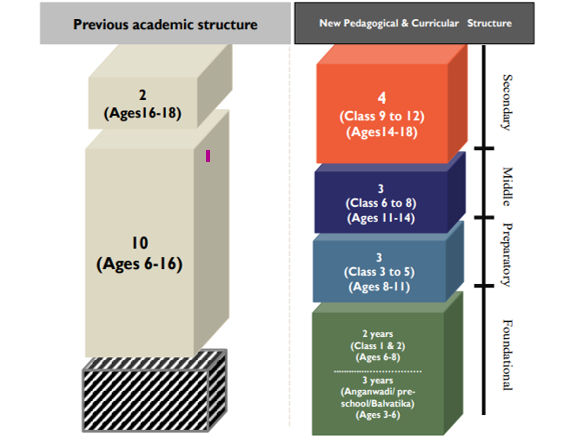The National Education Policy (NEP) 2020 is a comprehensive framework aimed at transforming the education system in India. It emphasizes foundational literacy and numeracy, flexible and multidisciplinary learning, and holistic development of students. NEP 2020 proposes structural changes such as the introduction of a new curricular structure with a 5+3+3+4 format, integrating vocational education from early stages, promoting multilingualism, and reducing the emphasis on rote learning. It also advocates for greater use of technology, teacher training, and autonomy for institutions. Overall, NEP 2020 aims to make education more inclusive, adaptable, and aligned with the needs of the 21st century.

NEP 2020 aims to strengthen the basic skills of students by focusing on foundational literacy and numeracy in the early years of schooling, ensuring a strong educational base for all learners.
NEP 2020 introduces a flexible curricular structure with a 5+3+3+4 format, allowing for a more seamless and age-appropriate transition between different stages of education, facilitating a smoother learning journey for students.
The policy promotes a multidisciplinary approach to learning, encouraging students to explore diverse subjects beyond traditional silos, fostering creativity, critical thinking, and problem-solving skills.
NEP 2020 integrates vocational education into the mainstream curriculum from an early age, providing students with practical skills and knowledge relevant to the current job market, promoting employability and entrepreneurship.
The policy emphasizes the effective use of technology in education and prioritizes teacher training to equip educators with the necessary skills and resources to facilitate innovative and engaging learning experiences for students.
ASDC is developing credit-based 60 hrs skill-based qualifications on the below technologies which can be offered to students as elective courses:

3D Printing

Automation and
Robotics

CAD/ CAM/
CAE

Cyber security

Data Science

IIOT

Electric Vehicle
technology

Design Safety

Automotive Technology

Sensor technology
Raising awareness of automobiles in schools is essential for preparing students for the contemporary world. Introducing basic automotive concepts through activities and discussions cultivates understanding and curiosity about vehicles and their societal significance, nurturing interest in related fields like engineering and sustainable transportation. Also doing National Automobile Olympiad (NAO) for School Students.
Link for National Automobile Olympiad (NAO)
Eligibility for NAO Any student of class 6-12th can participate individually or with School
By collaborating with industry, schools can establish centers equipped with essential tools to provide hands-on automotive knowledge. Alternatively, partnerships with nearby Automotive Skills Development Council (ASDC) training centers facilitate access to professional-grade resources, bridging the gap between academic learning and practical skills, and preparing students for future opportunities in the automotive industry.
"TOT" programs in automotive education equip educators with skills and knowledge through workshops and hands-on training, enabling them to deliver quality instruction to students and meet industry demands effectively.
Developing a 15-hour course for school students can focus on traditional or future technology, covering basics like mechanics and simple machines or topics such as robotics, AI, renewable energy, or sustainable transportation. Interactive sessions and practical exercises engage students and assess their understanding.
Industry visits for school students make automotive careers aspirational by providing firsthand experience and insights into various career opportunities. Guided tours inspire students to envision themselves as future leaders in automotive engineering, design, and manufacturing.
Conducting skill-based assessments for school students alongside academic evaluations provides a comprehensive understanding of their capabilities, guiding tailored instruction and fostering the development of essential competencies for future success.
| Four Wheeler Service Assistant | Level 3 |
| Four Wheeler Service Technician | Level 4 |
| Multi Skill Foundation Course | Level 2 |
E-learning Courses :
ASDC is offering School Courses and General Courses.Learn about ASDC School Courses: https://courses.asdc.org.in/schoolcourses
Learn about ASDC General Courses: https://courses.asdc.org.in/
Link for NAO-https://www.asdc.org.in/nao2024/
















For more details related to NEP 2020 and School Partnerships, please write to nep@asdc.org.in.